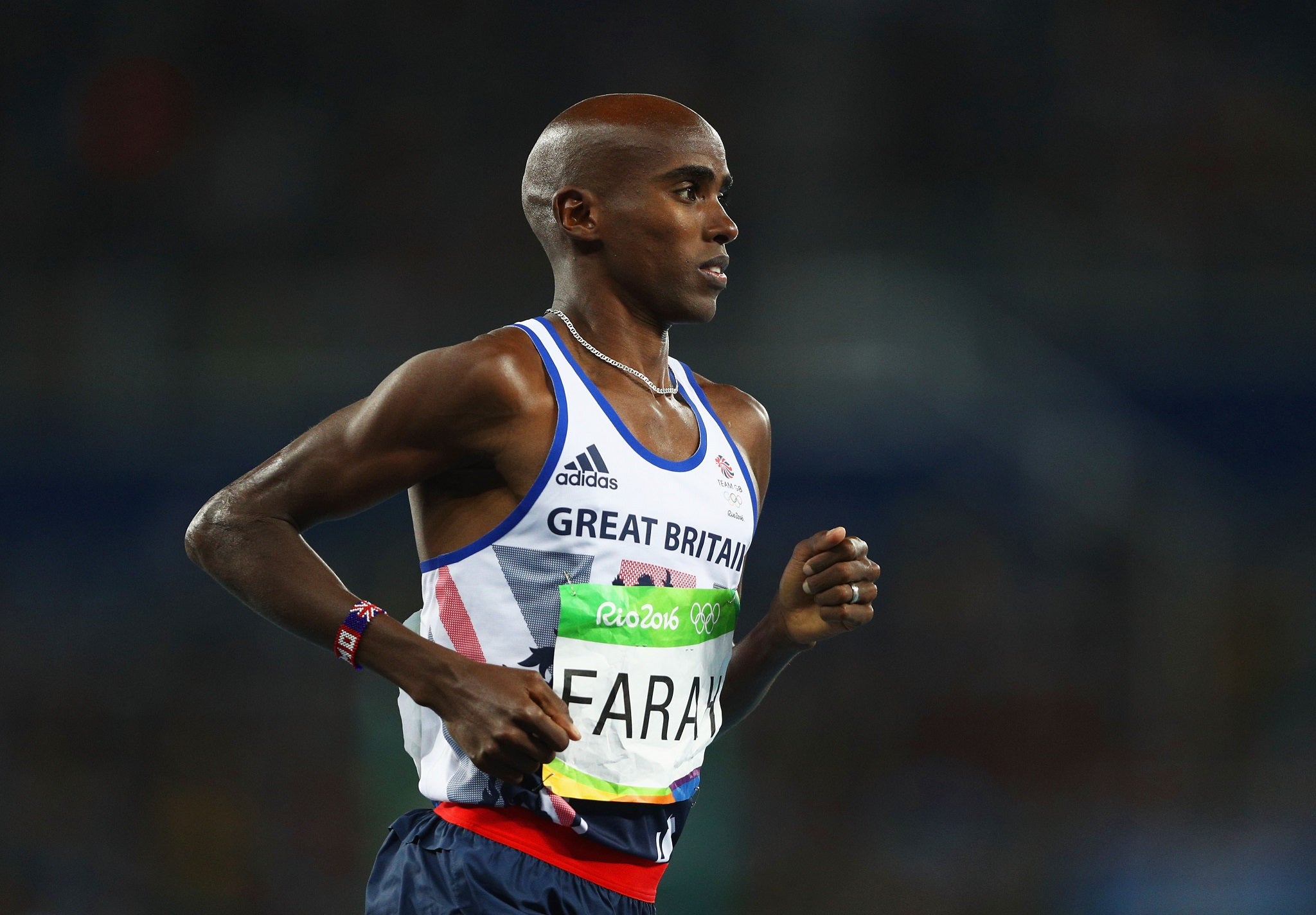Rio 2016: Mo Farah defends title to claim Olympic 10,000m gold
The Briton finished the race in 27.05.17 minutes to confirm his status as one of Britain's greatest athletes ever

The look on Mo Farah’s face when he was bundled down onto the track revealed alarm, because the fall was testament to the fact that there can be no certainties in his business, even when you have not lost a 10,000m race for five years.
He leapt up, trying to calculate in that enormous moment how he could reformulate his race without stumbling into the path of others who were racing by. A half-hour race had barely started at that stage but it was captivating, compelling, dramatic. That is what Farah delivers to a discipline which is receding from international meets because spectators don’t want to sit around to watch for the time it takes to run 10,000m. You can’t take your eyes off his race.
The first irony of the fall was that he started the race well back, running the first three laps at its tail to avoid trouble. The second irony was that the individual who inadvertently tripped him was his training partner, the American Galen Rupp.
“I was just thinking: ‘Try and get up as fast as you can,’” Farah related later. “I was thinking: ‘Don’t panic, don’t panic, don’t panic. There were quite a lot of laps left so I was just trying not panic, get through it and get my rhythm. I was asking myself: ‘Is the race done? Is the race done? I thought: ‘No I’ve worked too hard for this’.”
‘Done’ as in ‘over.’ It could have been. For a fall to happen when there are only few laps before home would have been Farah’s Mary Decker moment. The Kenyans who had been looking for ways of bringing him down, could have accelerated to capitalise and there would have been no time for him to make up the ground. “As soon as I got up I was thinking: ‘Did they see me and make a surge,’” Farah said when it was over. “And then I was thinking: ‘It’s ok even if they run 64 (second lap) 64 (second laps)to break me up. I think if it happened with five laps to go it would have been over.”
To hear him relate what his mind was computing in the midst of this crisis made the journey to gold seem the more extraordinary. Alarm? No this was panic. And he dealt with it. Of all the athletes to fall on Saturday night it had to be Farah – the leading player. And to add to the sense of a play with the play there was also the exchange of gestures between him and Rupp: the American ascertaining that Farah’s race was intact, Farah reassuring him that it was.
“There was a lot of pushing, guys slowing down in front of him, guys pushing from behind, but that's normal,” Rupp said. “I didn't want it to affect the race at all. I wanted to make sure that he was OK first and foremost. And then I told him to get behind me,” Rupp said.
A 33-year-old knocked to the track, scrambling up and still winning the race: this was the greatest of all those Olympic moments Farah has delivered up. It is a more substantial win than London’s Olympic event, though all that coalesced around Farah on Super Saturday four years ago - from the mobot to the look of astonished joy when he crossed the line – makes 2012 the defining one.
The elephant in the room when he came to discuss all of this was his relationship with those who are suspected of breaking anti-doping regulations. It took courage to ask Farah, as the Irish writer Ewan MacKenna did late on Saturday night, why he associated with Alberto Salazar, Jama Aden and John Smith. And it was an unconvincing answer MacKenna received in reply.
We yearn for transparency from Farah. But events spoke for themselves after he had recovered from the setback. Gradually he worked his way to the position he wanted to be, splitting the Kenyans who had vowed to defeat him, then watching them come back at him – yet driving on once more with extraordinary finishing kick he is capable work.
He made up the lost ground within four laps. Briefly he eased ahead into first place, displacing Kenyan Geoffrey Kamworor. Then the Ethiopians and Tanui drove past him again. Tanui continued to hold the lead. But Farah was running within himself; watchful, looking over both shoulders as the final lap approached, to see how the geography of the track looked. Then he drove for home.
It was not the kind of procession to the finishing line which he enjoyed at London. The Kenyan Paul Kipngetoch Tanui pushed him too hard for that. He collapsed at the finish and lay there, prostrate.
“It’s definitely up there,” he reflected. “Taking the fall and getting up. It’s an Olympic medal and Olympic medals mean the most to me.” The smoothness of his 10,000m, after the drama that went before it, will remain one of the abiding images of these Olympics for Great Britain.
Join our commenting forum
Join thought-provoking conversations, follow other Independent readers and see their replies
Comments